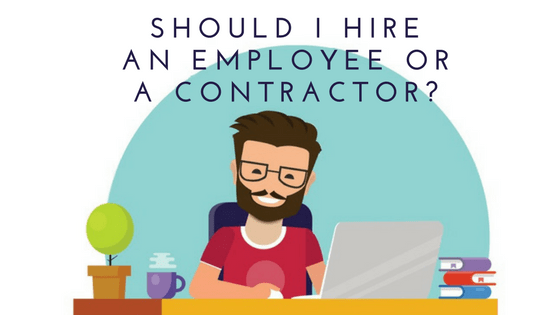Should I Hire an Employee or a Contractor?

When it’s time for you to hire someone, do you want to hire an employee or an independent contractor? The answer depends on whether the work you need help with is essential to your business, and if you need the person on a regularly. Keep reading to help decide which type of worker is right for your small business.
Employees
Someone is generally considered an employee if you control what, when, and where the work will be done. You’ll typically want to hire an employee if the job needs to be done under your supervision and you want control over the hours worked and tools used. It’s also a good idea to hire an employee if you will need the worker long-term and if the work is an essential part of your business.
Read also: Is It Time to Hire? 4 Telltale Signs You Should Grow Your Workforce
When you’re weighing your options, consider the benefits of hiring an employee:
- They tend to be more loyal to your business than independent contractors. Their loyalty can lead to increased productivity, especially if the person is willing to take on additional responsibilities as your company grows.
- You’ll be able to build a flexible, skilled workforce because small business team members often take on multiple roles at once.
- You’ll be better able to coordinate projects because you’re not trying to juggle multiple contractors who work varying hours.
- Consumers usually prefer to deal with people they’re familiar with, so if you’re hiring someone for a customer-facing position, an employee may be best for business.
- You won’t have to recruit new staff or renegotiate contracts continuously, so you’ll save money on human resources activities.
Some challenges also arise from hiring an employee:
- You’ll take on additional responsibilities because you have to ensure you have enough funds to pay your staff.
- There are extra overhead costs associated with hiring an employee. You’ll need to pay your team and remit employment taxes, and you may need to provide benefits. You might even need to move to a bigger office space or purchase more equipment.
- As soon as you hire your first employee, you become a manager. You will likely become less involved in your industry and more involved in managing your staff.
Workful can help you spend less time on administrative tasks and more time on what you do best. Learn more about how we can help you get back to business.
Independent contractors
An independent contractor is someone involved in an independent trade or business and offers their services to the public. If you hire a contractor, you have the right to control the result of their work, but not the methods used to accomplish the task.
Contractors are ideal if you need someone to perform work that isn’t central to your business or can be done by a professional who doesn’t need much supervision. You might also consider hiring a contractor if you need help on a short-term project with a defined timeline.
Read also: How to Know if Your Employee is an Independent Contractor
There are several advantages to hiring a contractor over an employee:
- You won’t have to pay employment taxes or provide benefits. Additionally, you may not need to reimburse the contractor’s expenses, further reduces your costs.
- Contractors often provide more flexibility because you can hire someone when you need them. But, when your business is slower, you don’t have to worry about laying anyone off.
- Most contractors are highly trained in their field, so you don’t need to spend time or money training them.
There are also some challenges that come with hiring a contractor:
- You can control the results, but the contractor can choose when and how they will complete the job.
- The person will often be working for other companies while working for you, so they’ll have less time to devote to your business.
- The contractor’s rates may change based on the project or the overall market demand, so you need to be willing to renegotiate.
Read also: Outsourcing for Small Businesses: Should You Hire a Contractor?


